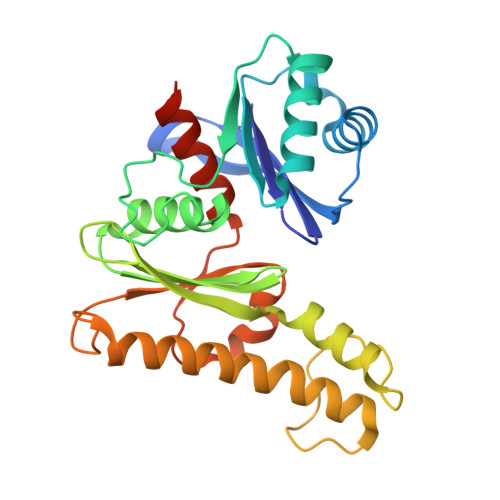Identification of a depupylation regulator for an essential enzyme in Mycobacterium tuberculosis.
Kahne, S.C., Yoo, J.H., Chen, J., Nakedi, K., Iyer, L.M., Putzel, G., Samhadaneh, N.M., Pironti, A., Aravind, L., Ekiert, D.C., Bhabha, G., Rhee, K.Y., Darwin, K.H.(2024) Proc Natl Acad Sci U S A 121: e2407239121-e2407239121
- PubMed: 39585979
- DOI: https://doi.org/10.1073/pnas.2407239121
- Primary Citation of Related Structures:
9B78, 9B79, 9CKU - PubMed Abstract:
In Mycobacterium tuberculosis (Mtb) , proteins that are posttranslationally modified with a prokaryotic ubiquitin-like protein (Pup) can be degraded by bacterial proteasomes. A single Pup-ligase and depupylase shape the pupylome, but the mechanisms regulating their substrate specificity are incompletely understood. Here, we identified a depupylation regulator, a protein called CoaX, through its copurification with the depupylase Dop. CoaX is a pseudopantothenate kinase that showed evidence of binding to pantothenate, an essential nutrient Mtb synthesizes, but not its phosphorylation. In a ∆ coaX mutant, pantothenate synthesis enzymes including PanB, a substrate of the Pup-proteasome system (PPS), were more abundant than in the parental strain. In vitro, CoaX specifically accelerated depupylation of Pup~PanB, while addition of pantothenate inhibited this reaction. In culture, media supplementation with pantothenate decreased PanB levels, which required CoaX. Collectively, we propose CoaX regulates PanB abundance in response to pantothenate levels by modulating its vulnerability to proteolysis by Mtb proteasomes.
- Department of Microbiology, New York University Grossman School of Medicine, New York, NY 10016.
Organizational Affiliation:
















